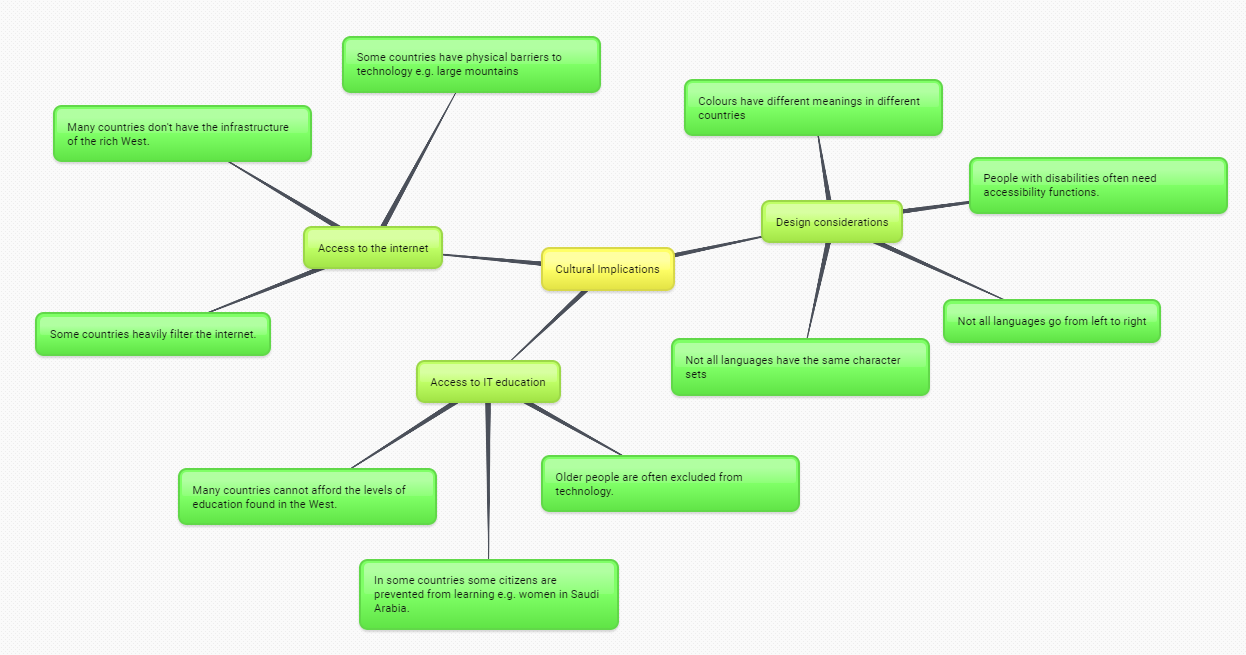Component 1
1.6 Ethical, legal, cultural and environmental impacts of digital technology
- Ethical impacts
- Environmental impacts
- Privacy
- Cultural implications
- Laws of computing
- Software licenses
Ethical impacts
Ethical concerns around computing technology are all about whether something is "moral" or "right" or "wrong".
This means there is no definite answer and having an opinion is valid as long as you can support it with evidence. Common ethical concerns in computing include:
- "The Digital Divide". This means some people have access to technology and some don't. For instance, people in richer countries tend to enjoy better technological infrastructure. In the UK, people living in cities will likely have better access to tech than those who live in remote locations. Being younger makes it easier to understand new technologies than it is for those who grew up without them.
- Employment. Often new technologies can replace people's jobs. Many people fear that AI will eliminate huge quantities of jobs.
- Embedded bias. Sometimes, technology (especially new generative AI) can have unintended biases built in. For instance, it has been found that some AI programs are less likely to recognise black and asian faces when compared to caucasian faces.
Environmental impacts
| Good | Bad |
|---|---|
Using computers saves paper:
|
Computers use energy! Energy means fossil fuels are burned which increase climate change. |
Using video conferencing services has reduced the need to travel for meetings. |
Computers are full of noxious chemicals that cannot easily be disposed of. Most of these chemicals end up in landfill sites damaging the environment for decades to come. |
People can now work from home by dialling into their work’s server. This reduces commuting and thus reduces carbon emmissions. |
The mining of metals needed for computer manufacture has huge carbon implications. |
Privacy
Privacy is simply the right that all people have to not be watched. Many people feel this right is being eroded away in modern society:
- CCTV cameras are found in most town centres.
- Number plate recognition systems track your car wherever you go.
- Phone GPS systems can track your movements on foot.
- Your ISP can keep records of your internet habits.
- Your phone can be tapped by police under certain circumstances.
Many citizens have tried to combat this by using technologies that mask their IP addresses and encrypt their messages but the government is often pushing for even more control.

Cultural implications
Read the points in this mind map for some ideas surrounding the cultural impace of computing technology:

Legal implications
| Law | Description | Detail |
|---|---|---|
The Data Protection Act 2018 |
The law that prevents the misuse of personal information. |
8 principles:
|
Computer Misuse Act 1990 |
The law that stops people causing harm using computers. |
Crimes are:
|
Copyright Design and Patents Act 1998 |
The law that protects published works and makes sure that only their creators get the rewards. |
Any work that has been published e.g. book, film, music, software, TV show is covered by copyright law. The law states that the owner of the copyright has the right to be paid for the work they have done. Any copying or redistributing of the work is illegal. |
Software licenses
When you buy software, you are technically just buying a license to the software. This makes sense as software isn't something that has a physical presence you can hold. Licenses allow you to do different things with the software:
- Proprietary (closed source) license. This is a traditional software license. A company makes the software, and you pay them to get the license to use it "off the shelf". The license will usually state that you can't change it, resell it, copy it or give it to anybody else.
- Open source license.This license is very different. Open source means that you get the source code (the actual code used to program the software) along with the software. This means that you can freely edit the code and alter it to suit your needs. Open source software is usually free and is created by teams of volunteers around the world who give up their time to create and maintain what they see as worthy projects.
- Creative commons license. This license involves the creator just realising their product for free. They are basically saying they don't mind what you do with it, they are giving it away free for the good of everybody.